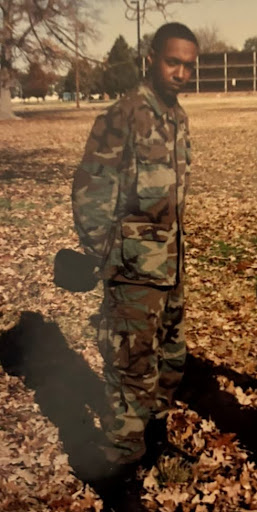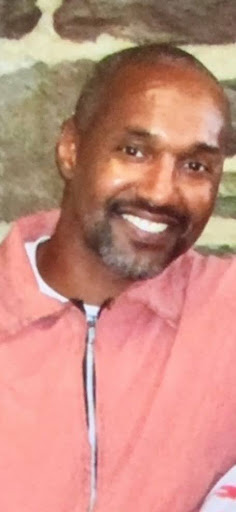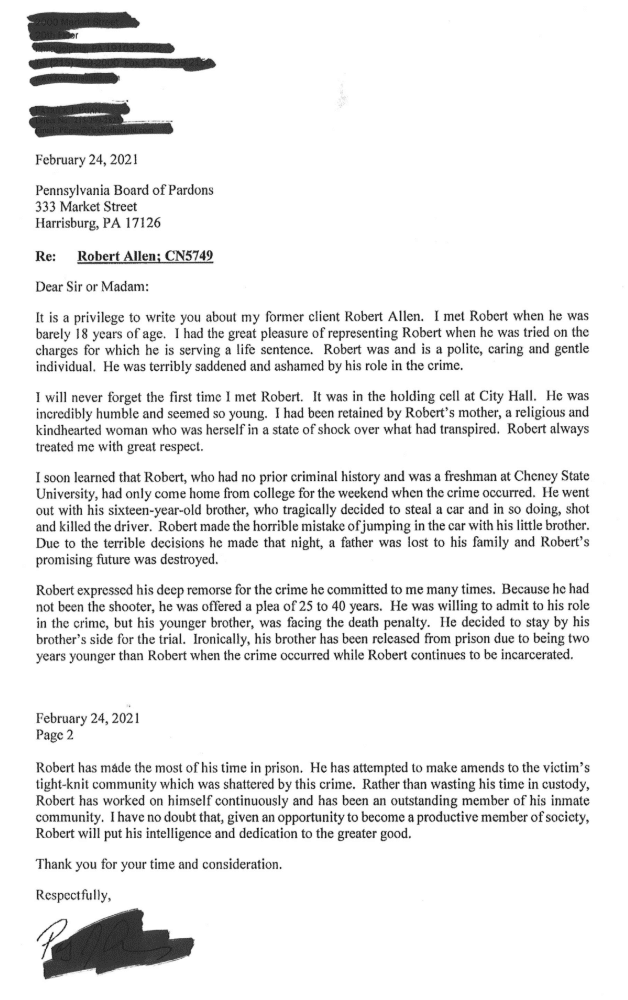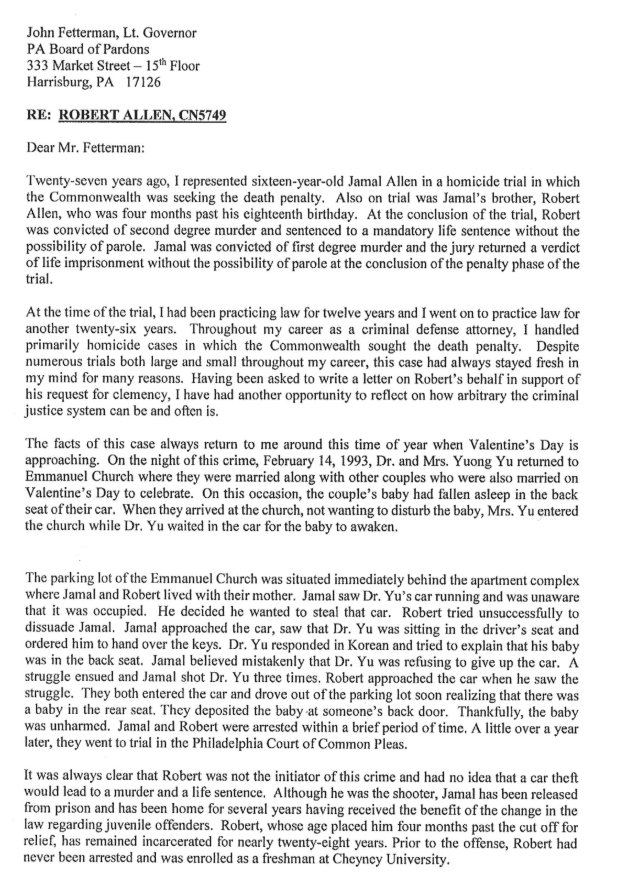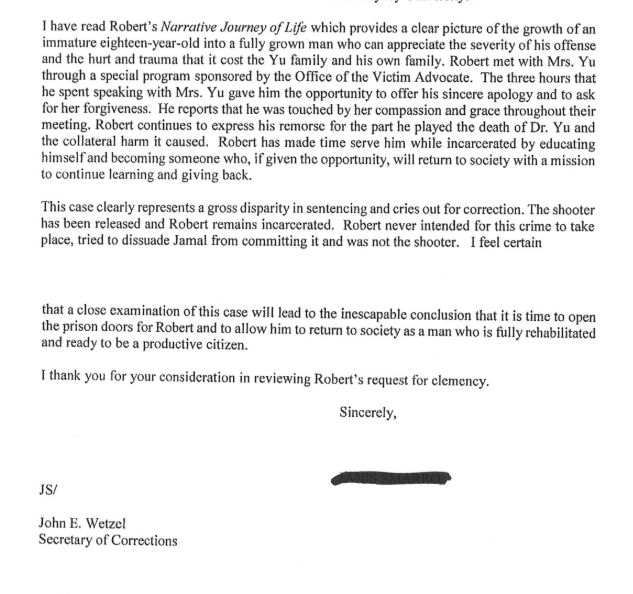Robert Allen
November 26, 2025
Robert’s story has been lightly edited for clarity.
Disclaimer: This document consists of parts from a full narrative Robert wrote about his development in prison. You should know this document was originally written in 2021. The full writing is about 15 pages long. Today, Robert turns 50 years old October 1st, 2024. He has served 31 years 6 months of a life sentence.
Serving “Life”
My Narrative Journey to Self-Identity, Rehabilitation & Redemption — Abbreviated
Introduction
The idea of clemency being perhaps the final means by which I can return to society came with the opportunity to reflect on my personal development. While release is not promised by such means, I saw a chance to explain my growth in a detailed chronological fashion by sharing my life story. When I ponder who I was at 18 and who I am today, I can conclude; although incarcerated the last 26 years I experienced transformation from adolescence to adulthood. It’s been a tremendous gap between what I now understand regarding maturity; not just in word, but including my actions. Now, at 44 years old I know early development is the most formative years of any young man, but growing up in the prison culture is unlike anything comparable. However, today I have a positive self-identity, I understand rehabilitation and I have experienced redemption.
Ages 18-24
Display of False Images
Entering to prison at the age of 18 I was unwise to the culture, shallow in the perception of life and full of the stigmas of what a male was supposed to represent. I was immature. Initially, the arena of prison shaped my mind to adopt to what I thought was maturity. I realized overtime this was far from the truth. I was deemed reckless, unaware of the journey before me, a teen convicted of a ghastly crime that overtime would have to progress into manhood despite the time received.
I admired the false sense of bravado amongst men. This was a mistake. I never had a father. I didn’t have an example of a man…before prison I respected the hustlers as the best examples of manhood. I could not determine what image was real or fake; which is sad to admit, but at this stage in my life I was impressed with everything that presented assertiveness. I respected men who; could fight, had status, could pay for a good lawyer and always had money.
My everyday life consisted of surviving and worrying about my mother & juvenile co-defendant, my little brother. I spent my time learning the environment instead of learning what I was facing. By 19 years old the phrase “Know thyself” was mentioned through a conversation with an older inmate. I had no idea what he was talking about or why he mentioned it. It would be 20 years before I understood the depth of the phrase.
State of Denial
October 19, 1994. Numb would be the best word to describe how I felt that day. My co-defendant and I were found guilty of murder. As the sentence was pronounced, I remained level headed after hearing, “LIFE”, yet stunned at the outcome. My ignorance, along with hearing the stories others shared, I believed I would come back on appeal. Listening to all the words in the judicial setting never registered. The language was different from anything I had ever heard prior to this experience.
…… what just happened to my life? By now the only fortunate thing was my brother and I were eventually both sent to SCI Coal Township.
Initial Entry, Anger & Anxiety
The confines of 12’ by 12 triggered anxiety I had never experienced. The rules didn’t sit well with my brother and me. Therefore, we rebelled against this change of environment.
My arrival to a state prison allowed me to engage for the first time with men who were in prison for nearly 20 years. I met a guy we called “Raw Truth”; he was an ex-black panther and I met a man we called “Brother Kenyatta”. Looking back, these men were planting seeds of rehabilitation amid my denial, anger and anxiety. Further, they were anchors for learning it would be up to me to become the image of a man I could live with. These men, through conversation introduced me to literature I had never read.
I begin to study black history with a fervor. I was looking to point blame for my poor decisions, so anger was the norm or remedy for everything. My attitude allowed my brother and I to walk with a chip on our shoulders. We displayed progressive images of militancy. I thought this was the conduct I should exemplify since I was the black guy getting all my instructions from a different nationality or as we aggressively yelled: The White Man. I thought I was doing the right thing with information I acquired. I didn’t use the knowledge to grow; what a pure example of the immaturity I continued to reason with.
Ages 25-31
Developing a Love for Knowledge
My goal was to return to society, but I did not have a plan. I believed for so long the appeals would work themselves out as soon as the judge heard the evidence. I was wrong in thought, wrong in substance and wrong in my methods.
Transferred to another facility further than the last, but it allowed an opportunity for me to piece together how I wanted my life to move forward. By now I had read a plethora of books, but didn’t really comprehend them. I started building my vocabulary and uttered a bunch of rhetoric about what I thought was truth related to; the suffering of black people and how the system robbed youth of their humanity by exploiting us as indigent slaves to the system. Yes, I was still angry, but now I had solid reasons to uphold my anger. I had quotes and facts to justify my increased anger supported by history.
I thought my assertiveness was validated. ]Therefore, I continued to struggle with who to connect with and what to do with a life sentence. Since the knowledge in books didn’t hurt me or create misconducts I thought it could empower me.
Developing Work Ethic & Addressing Anger
I started doing my time alone although surrounded by thousands. The new environment came with new challenges and new ways to get through my day. I wrote inmate employment and was hired in the kitchen. I was unsuccessful. I did not want to take orders from anyone. I felt degraded at .19 cent an hour. Even more disturbing about my thoughts was I relegated the black steward instructing me to being someone who should bend the rules. Of course, I was written up and fired. In hindsight, I had good intentions to occupy my time productively with a job, but had no sense of work ethic. How could I? Prior to prison I earned most of my money selling drugs and I made all my decisions with no boss to answer to.
I took the anger management course. The curriculum seemed informative, but I felt I understood such fundamental objectives. I didn’t feel I was angry. After all, I did graduate high school and went off to college. As the course initiated I realized the curriculum was designed to examine how mentally fit I was with resolving issues. I discovered I was indeed angrier than I knew.
By this time, I continue to hear and read “Life” was my fate. After two appeal denials I am not shaken with frustration of rejection by the system. Now age 27, I began to take a few classes.
I voluntarily began to take; math, english, typing and reading courses. By now I have friends; Shawn and Leem who I willingly assist with their GED study. Unconsciously, I thought the classes would keep my mental & academic faculty functioning while in prison. I wanted to take more courses, but I noticed all the prescriptive jobs to acquire skills & training that the prison offered, required a minimum sentence date to sign up. Lifers were not deemed priority. For decades (depending on the prison too) Lifers were not getting access to all the programs implemented by the DOC.
Dealing with My Reality of Time
I started playing intramural sports. I coached a varsity team. My involvement with the sports during this stage of my life exposed me to the male ego, pride, selfishness, anger and the behaviors displayed when such emotions are not controlled. I discovered many of the men could not escape such behavior. My observation from this experience drove me to conclude; I did not want to be someone who never modified my views or change my ways under different circumstances. Although confined, within myself I reasoned; no change could be made forceful. Individuals must be willing to do something on their own. So, I asked myself, “what are you willing to change and why?”
During an era where books are still the norm (not computers) I checked out 3 at a time. With no assistance, I set out to learn the law. Lost would be an understatement. I was confused and bitter from what my lawyer didn’t do correctly that led to me receiving “LIFE”. After all, I knew I hadn’t killed anyone. I was a part of the crime, but was serving life among men who killed someone. Why did I get so much time? My frustration was increasing as I collaborated with others to understand. I couldn’t grasp what was being said in briefs, court filings, appeals, rules or legal principles. I realized how inadequate I was at my best reading level. Facing my inadequate abilities in areas unknown was triggering a different level of resentment. However, I never gave in or gave up. I realized I had to use time to learn more.
Establishing Self Identification
My motivation was not self-centered this time. I wanted to do better for those I let down. I weighed the decision to keep friends happy by remaining the same person against the reality of going in a different direction representing courage and I chose to be courageous.
The character I wanted to maintain begin to be extremely different from the false image of manhood I entered the institution with. During this crossroad to rehabilitate I discovered the challenges I had to address weren’t the impressions of the men around me, but it was learning; mental, physical and spiritual courage. These were 3 areas of my nature as a man I had to commit to giving great balance if ever I wanted to reflect being a man when I finally left prison.
Positive Role Models & The Impact of being Mentored
The desire to do anything that would increase my awareness; mentally, emotionally, vocationally and spiritually was the road to rehabilitation. The friends I had on the outside of prison at that time were starting to piece their lives together with; employment, family, career goals and income. Emotionally, I was unfulfilled. Deep down, I knew my family was struggling with what to do, but they tried to support with small acts of generosity. I experienced a few misconducts in this stage, but I knew in those moments of solitary confinement; prison was not a place I wanted to squander time.
It pained me to accept my mother had to travel between two institutions to maintain contact with my brother and me. Fortunately, I met a brother named Irvin Moore who had been in prison 30 years. Astounded by what he had been through and observing how he was dealing with matters; I began to hang around him often.
Irvin emerged as a mentor for me. He was a teacher apprentice in the architectural drafting program. SCI Rockview had an elite program in which our teacher was an architect that designed buildings in Wisconsin and New York. The program required me to take a series of test, get a vote sheet passed around for qualification and then be interviewed by the teacher Laszlo Paul Ivanits, “Mr. I” as we called him. Irvin had a profound role with my exposure to this type of experience within prison.
Impact of Vocational Training
I was selected as 1 of 12 students and studied Architectural & Mechanical Drafting at SCI Rockview’s vocational program. For two years this vocational program opened my mind to; different cultures around the world, discussing the backgrounds of others and hearing stories that were different from the lifestyle I had known prior to prison. Mr. I had taught with an unconventional approach knowing the content of the course would be difficult to comprehend. For example, in the morning we meditated before work, listened to Mozart 1, 2, 3 symphonies, listened to jazz classics like; Miles Davis, Charlie Parker and Kannbar Ali. We read classic novels and discussed politics (those were testy moments). Mr. I was a world traveler who believed in redemption. Each week we had to complete a test and give oral presentations to increase our communication skills. I learned to read; “blue-prints”, “perspectives”, learned auto-cadd, Microsoft 2003 and how to understand measurements. For more than a little over 2 years in the program I was not only learning a vocation, but I was learning about myself. Suddenly, I understood the old saying “know thyself”.
After 10 years at SCI Rockview I put in for a transfer. I was granted an incentive base transfer. This had a positive affect; allowing the reunification with my brother. Additionally, it minimized the traveling hardship on my mother.
Ages 32-38
Reunification & Programming
My transfer to SCI Dallas was the first time in over a decade I saw the outside world in real time. It was a world I once knew, but no longer felt a part of. The ride afforded me to witness the change with technology. I saw people using their cell phone as they moved throughout the streets doing normal things. Visually I felt like I belong. For a moment I was no longer an inmate but felt like a citizen too. However, the reality of riding on a prison bus surfaced.
At this stage in my life I have given up my immature ways to occupy recreationally, such as; gambling, playing sports and anything that would hinder my desire for meaningful ways to pursue liberty.
Although I did not complete the course; I studied from the Blackstone Paralegal course. The program opened my mind from a civil perspective; introducing how the government created laws.
Additionally, I took a creative writing course, participated in the Lifer’s Committee. I served as a legal coordinator on the lifer committee. My role as legal coordinator entailed assisting with the creation of an introductory package for new men coming into the prison system who were unaware of the legal steps related to filing appeals. I wanted to help individuals who seriously wanted to help themselves. Never again would I subject myself to the norms of prison culture I adopted decades ago. At this period in my life I had successfully identified a way to be civil and implement something that would offer aide to those around me.
Behavior Modification & Living in Community
When I reunited with my brother I thought life inside prison would get much better for us, but it didn’t. As years inside the penitentiary turned into decades family seemed less enthused, more complacent with the idea that our sentence was permanent and not fixable. Yet, my mental stability served as an anchor for progression and for the first time; the lack of support from the outside world did not rise to the level of resentment. Instead, I continued to increase my study time, poured over notes, briefs, discovery, talked with men similarly situated to determine what we could do collectively. Suddenly, I had a consciousness for the community around me.
My rehabilitation was apparent to me when I no longer sought to gain my freedom alone. Instead, I thought of ways to help those around me. I did not have this awareness of community and collective responsibility prior to prison.
During this time, my mother had been diagnosed for the second time with cancer. Although dazed by the news and fully aware that her only children are in prison when she needed care the most; I somehow continued to learn and grow. I processed things correctly with both staff and inmates alike. I listened to responses and tried to understand instead of judging. Applying such skills dramatically reduced problems with staff and I reduced the misconducts I once earned in my youth. I now understood the impact of thinking before I react.
I reached the realization that a huge portion of my immaturity in the past was directly connected to my inability to live up to the positive influences my community and family tried to instill in me. As a man, I could admit to myself; my biggest problem was caving in to others, in hopes I could change them, but now I understood as a teen I didn’t have the capacity to change anyone, but myself. In my late 30’s I no longer wanted to represent anything other than a man of respect and wisdom within the institution. I had reached a different sense of empowerment. I was fueled by the realization that what I do affects others. In this moment of clarity, I could determine it was what I failed to do the night of my crime that forever affected; the victims’ family, my family and so much more. I had to own the decisions I didn’t make, yet I realize I didn’t have the experience at 18 to think beyond the present moment.
Remorse & Redemption
I was notified by my counselor that a voluntary group asked would I be willing to speak with the widow of the victim in my case. This was a breakthrough project created in Harrisburg. The Office of the Victim Advocate received a solid yes as my response to participate. A meeting was established between the coordinators and my brother. Over time a meeting was approved. For the first time I formally met Mrs. Yu.
I was worried too. My emotions were more than I can recall. This meeting, beyond anything I thought before was the humblest display of humanity I had ever seen. Mrs. Yu acts of; kindness, graciousness, temperament and self-control was like nothing I had ever encountered.
I expressed my sincerity and humbly apologized. We dialogued for over 3 hours. It was an experience that was truly mind blowing. It was in that moment that I had reached the peak of my rehabilitation journey. As a man I faced the damage I caused. I could internally mend to forgive myself with Mrs. Yu’s great compassion toward my brother and me. My opportunity to restore through transparency and mediation with Mrs. Yu sealed my self-defining moment as a rehabilitated man.
The victim advocate meeting assured me that second chances are possible.
An opportunity to re-enter society would give me a satisfied urge to involved myself as a productive citizen who will better serve the community. I’d continue to find ways to educate, be a mentor to other youth who may make a wrong decision in life or attempt to destroy the quality of life for others. I have grown from a teenager who came into prison 26 years ago to the man who now writes a plea for clemency. The greatest achievement is to know that life decisions are made in an instant and some decisions can be made over a lifetime.
Ages 39-44
Hope for Youthful Offenders
An extraordinary change in my life has been the release of my co-defendant, cellmate and brother. Witnessing this event added a greater perspective to my life in hopes, that I too can get a second chance. While much appreciation has been given to the decision of the Supreme court for granting the relief that made it possible for my brother to leave prison due to his age at the time of the crime; I have no other recourse to petition for freedom. Four months separated me from many similarly situated. Therefore, I humbly ask the Board of Pardon recognize 4 months prior to my crime I was legally a juvenile. Turning 18 did not immediately provide me with the sound judgement to consider all the damage that unfolded the night Mr. Yu’s life was taken. Today, I know crime takes away a citizen’s ability to trust and invokes the fear to live comfortable in their own space; this was something I had to realize regardless of my level of participation in the crime.

